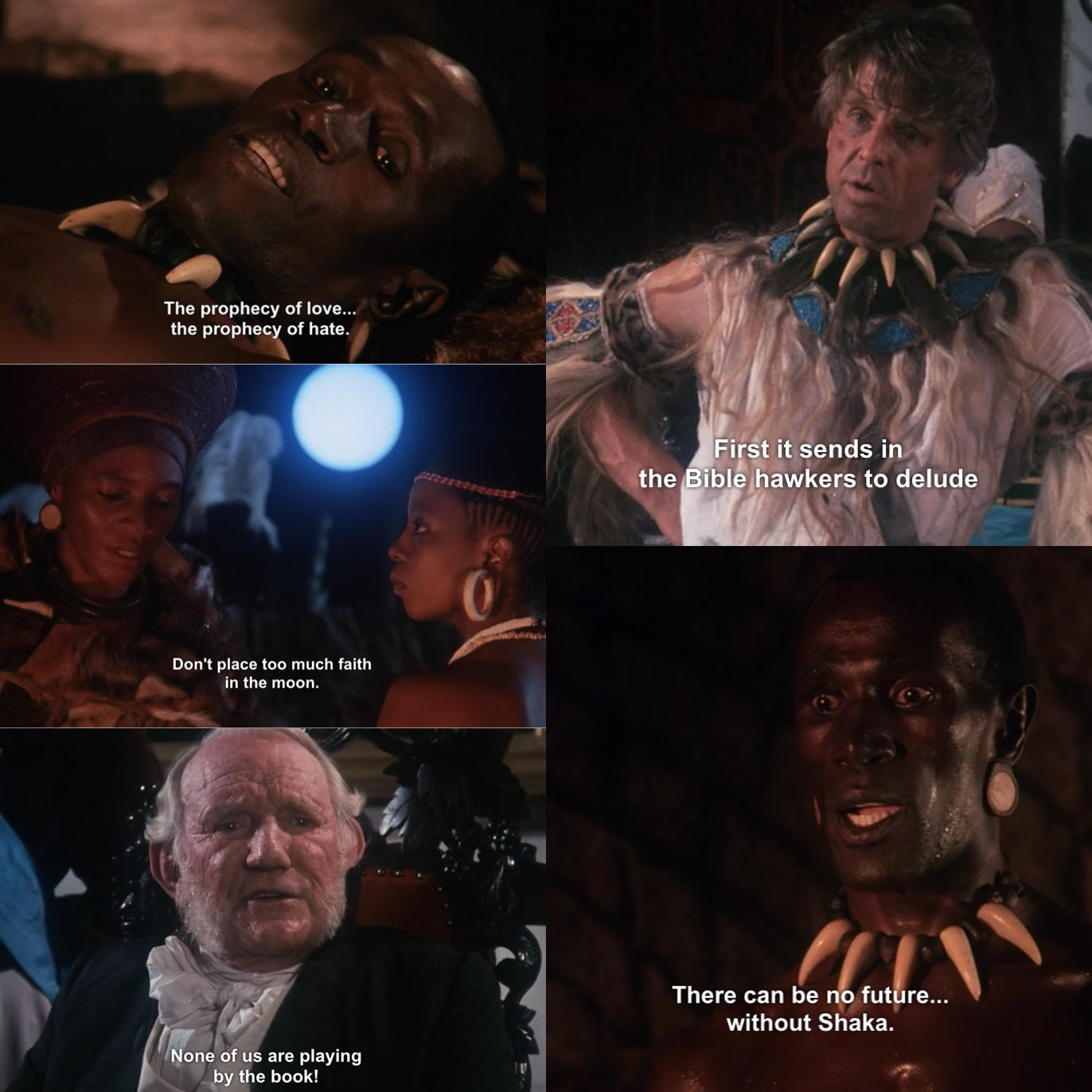Night-5 Hour-1

Shaka: “So, you have deceived me, just as you deceived my father. I have made you Queen of Queens. The most powerful woman in this land… in the world! But that was not enough for you, mother. You wanted more!”
Nandi: “I love you, Shaka.”
Shaka: “Love… Love? We are incapable of that emotion, mother. All that we feel, all we ever felt, is vengeance and hate… hate… hate! And I am the product of your hatred, just as [my son] is the product of my hatred.”
Nandi: “No… No… He is the future. Through him, your name will live forever.”
[Shaka angrily strikes Nandi]
Shaka: “No, mother. There can be no future… without Shaka.”
— Shaka confronts Nandi about hiding the birth of his son and heir. From hour nine of Shaka Zulu.
Self-deception is a major theme of night five’s first hour. Among the Sparrows, it is Lt. Francis Farewell’s new Zulu identity of Febana, king of Port Natal that deludes him into thinking it has a realistic future, despite the flimsy lies told to Shaka that garnered that new name and small chunk of coastal land. After the other Swallows voice their desire to build a boat to sail south to the British Cape colony, Dr. Henry Fynn privately tells Farewell, “We may be dressed up to play the part, but we can never be Zulu — and that has little to nothing to do with the color of our skins. You need that boat more than they do. They may have lost their courage, but you… you’re losing yourself.” He also points out the audacity of Farewell’s deceptions to date:
You’ve called not only Shaka’s bluff, but the bluff of the past ten millennia of civilization. Life, death, youth, resurrection, friendship. We’ve even turned the sanctity of Christ into a political device! Shaka is becoming the victim of our sophistry! And so are you!
The results of European use of Christianity to control native peoples is another theme addressed in this hour, beginning with the appeal of Jesus for Shaka — who responds to a private biblical reading by Fynn, soon after allowing Farewell to sail to the Cape colony with an embassy group of Zulus:
Fynn: “‘He who believes in me and is baptized will be saved. He who does not believe in me will be condemned.’ [Looks over to Shaka] He who is not with him… is against him.”
Shaka: “The prophecy of love… the prophecy of hate… surprisingly alike. ‘With me or against me.’ I’m beginning to realize that Georgie himself has little to do with my embassy to your kingdom. If your people truly believe in Christ, it is with him that I must ultimately negotiate. And I understand him well. We are both tyrants in our own ways. So either your King of Kings serves me, or I him. I see no room for compromise.”
That uncompromising attitude mixed with the “immortality” granted to Shaka by the Swallows means the king will not tolerate an heir he does not need. So, when the Zulu maiden Pampata becomes pregnant with Shaka’s son, Nandi warns her to go into hiding with the child. Shaka’s mother is all too aware of his hate-fueled instincts that her own youthful parentage helped to create. However, the baby heir’s existence is soon discovered by Shaka, who orders the boy killed, after chastising Nandi for her betrayal of his belief in their heaven-powered status, and angrily striking her face. That will later be rewarded with cutting final words from Nandi, when she grows deathly ill from grief over her grandson’s murder, and tells Shaka, “You have killed me.”
Meanwhile, Farewell’s Zulu-crafted sailing ship has reached the Cape colony, where the exotic wardrobe of the crew is met with excited fascination by local White residents. Entering the governor’s offices in Zulu garb, Farewell has a tense conversation with Lord Somerset about Britain’s insidious colonial strategy for suppressing native peoples like the Zulus:
Somerset: “Quite a spectacle, Farewell. You’ll have Cape Town all abuzz with anticipation of what your little circus can do. Can I offer you some rum? You do remember what that is?”
Farewell: “It’s the colonist’s greatest weapon, next to bible hawkers and guns. It’s all part of the Crown’s official policy when extending its boundaries amongst the so-called ‘natives.’ First, it sends in the Bible hawkers to delude their simple hearts, and then the rum seller captures their stomachs, and then finally the armies take rightful possession. Yes, sir, I remember what it is.”
It’s a remarkable exchange to appear on American prime time network television In 1987, and only ten minutes before Shaka calls Christ a tyrant. After all, Shaka Zulu was also seen by curious Fox viewers in a vast swath of U.S. states known as “the Bible Belt.” Yet, such is the long-game approach of Joshua Sinclair’s script to establishing the Swallows’ use of Jesus as a double-edged sword against Shaka, that Farewell’s frank description of Britain’s larger-scale religious mechanisms of colonial control feel (much like the miniseries’ depiction of gore and partial nudity) well-earned, and hard to argue for its censoring.
Yet, Shaka Zulu maintains an even-handed approach to depicting the unsavory acts of its subjects — including Shaka. Soon, Farewell will return to a Zulu kingdom suffering under the bloody grief of a ruler whose self-control has unraveled in the wake of his beloved mother’s death, and who now unleashes the terror of his hate against his own people.

